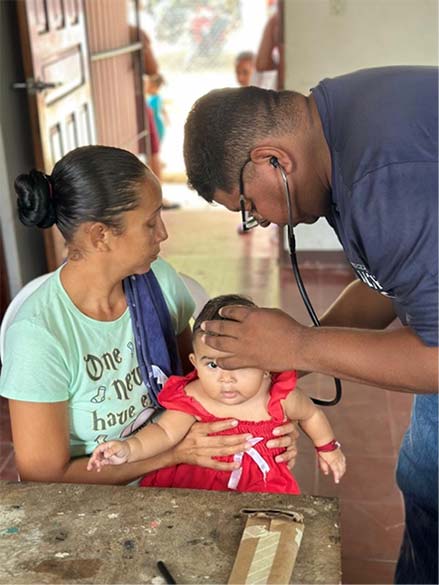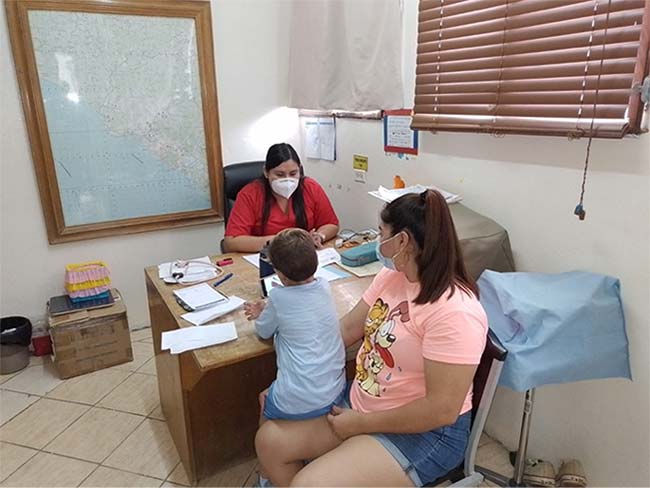This year’s World Mosquito Day on August 20 commemorated Sir Ronald Ross’s 1897 discovery that female Anopheles mosquitoes transmit malaria between humans. It also highlighted the ongoing global battle against mosquito-borne diseases such as dengue fever.
The fight against these diseases has never been more critical.
As global temperatures rise and international travel increases, dengue fever is spreading to regions previously untouched by this mosquito-borne disease.
“We’re seeing it spread all over the world,” notes Morgan Coulson in a recent Johns Hopkins Bloomberg School of Public Health analysis. “We’re now seeing cases in areas where we hadn’t seen them before, such as Southern France.”
For the coastal communities of southwest Nicaragua that the Roberto Clemente Health Clinic serves, mosquito-borne illnesses such as dengue aren’t a new threat – they’re an ongoing reality that requires vigilant prevention and expert treatment.

Fighting Malaria and Dengue on the Front Lines
While mosquito control programs have saved millions of lives – with significant progress made against malaria and dengue between 2000 and 2015 – experts warn that this progress has stalled, and in some places, reversed.
Public health researcher Michael Adekunle Charles identifies four critical factors contributing to this concerning trend:
-
- Mosquitoes continue to evolve, developing resistance to both drugs and insecticides. Traditional vector control methods, including insecticide-treated bed nets, are losing their effectiveness against these adaptive insects.
-
- Climate change is dramatically impacting weather patterns, bringing more rainfall that creates additional stagnant water – ideal breeding conditions for mosquitoes. This climate impact is already visible: Pakistan experienced a fivefold increase in malaria cases in 2022, directly linked to flooding.
-
- Global conflicts are displacing populations, separating people from their usual protective measures, such as bed nets and established vector control programs.
- Funding for mosquito control has steadily decreased since 2015, limiting both the development of innovative new tools and the distribution of existing ones to communities that need them most.
For Nicaragua’s tropical coastal communities, these global challenges intersect with local realities. Our region’s climate creates perfect conditions for Aedes aegypti, the mosquito species that transmits dengue, chikungunya, and Zika. Urbanization in these areas contributes to rapidly expanding populations, thereby increasing the transmission potential.
The infrastructure and economic challenges our communities face compound these difficulties. As Coulson observes, “We don’t see dengue spread quite so much in the continental U.S. because we have so much air conditioning – people don’t have windows open. If they do, they generally have screens on those windows which prevent the mosquitoes from entering the house.”
Our Nicaraguan coastal communities don’t have these passive protection advantages, making active prevention and expert medical care essential.
Our Team’s Comprehensive Response
Expert Clinical Care
When patients present with characteristic dengue symptoms, such as muscular and joint pain, headache, rash, abdominal pain, or nausea, our medical team conducts thorough evaluations to assess their overall condition and identify potential warning signs. We’ve developed protocols specifically designed for dengue management, keeping suspected cases under careful observation while providing supportive care: rehydration, blood pressure monitoring, fever reduction, and comfort medications.

Our on-site laboratory testing capabilities enable us to confirm suspected cases quickly, and we schedule regular follow-up appointments to monitor patient progress. For stable patients, we provide outpatient management with appropriate medications, such as Tylenol and electrolytes, while ensuring they understand the critical importance of avoiding certain medications that could increase bleeding risks due to platelet depletion.
When patients present with alarming symptoms, we stabilize them immediately before referring them to the hospital in Rivas. This triage system ensures that every patient receives the appropriate level of care based on their condition.
Patient Education and Safety
Every dengue patient receives comprehensive counseling about home care, warning signs to watch for, and the dangers of self-medication. This education component is crucial; patients and families need to understand when to seek immediate medical attention and why certain common medications could be dangerous during dengue illness.
Community Prevention
Beyond treating individual cases, we recognize that dengue and all mosquito-borne illnesses requires a community-wide approach. Our team regularly conducts educational talks focused on identifying and eliminating standing water where mosquitoes reproduce – a critical prevention strategy that addresses the root cause of transmission.
Partnership With Public Health Authorities
Our work extends beyond our clinic walls through active collaboration with Nicaragua’s Ministry of Health (MINSA). We coordinate with MINSA to organize fumigation campaigns in surrounding communities and maintain rigorous disease surveillance by reporting all suspected and confirmed dengue cases. This partnership ensures that our local efforts contribute to broader national dengue control strategies.
Why Expertise Matters
The importance of specialized dengue experience cannot be overstated. As one dengue expert notes, “I always say that if I got dengue, I wouldn’t want to be in a U.S. hospital. I would want to be in Ho Chi Minh City or Bangkok. Because we don’t see dengue the way people in Vietnam and Thailand do.”
Our clinic has developed exactly this kind of focused expertise – our staff understands dengue’s progression, recognizes subtle warning signs, and knows how to provide the supportive care that can mean the difference between recovery and severe complications.
A Model for the Future
Recent WHO recommendations emphasize the need for innovative, multi-sectoral approaches to preventing mosquito-borne diseases. The organization has begun recommending new categories of prevention tools, including spatial repellents – plastic or mesh sheets that hang on walls and diffuse insecticide for up to a year – designed to complement traditional mosquito control measures.
Health experts also advocate for integrating technical advances in artificial intelligence, surveillance, and outbreak prediction into current prevention strategies, while utilizing social media and citizen science approaches to support household and community engagement.
Our integrated model – combining expert clinical care, patient education, community prevention, and public health collaboration – represents exactly the kind of comprehensive strategy experts believe is necessary.
The Roberto Clemente Health Clinic’s dengue program demonstrates how community health clinics can serve as vital hubs for this coordinated response, providing both immediate medical care and long-term prevention education that engages entire communities in the fight against mosquito-borne diseases.
To make a donation to our non-profit charity and support the team’s ongoing work to prevent and treat mosquito-borne illnesses and emergencies, go here.
Your donation is very much appreciated – and goes a long way in Nicaragua, the second poorest country in the Western Hemisphere after Haiti. We are a 501c3 registered in Maryland, so your donation may be tax-deductible to you. We also accept stock and other commodities as donations.
Here’s to your good health,
Julia C. Guth
Chair, The Roberto Clemente Health Clinic
